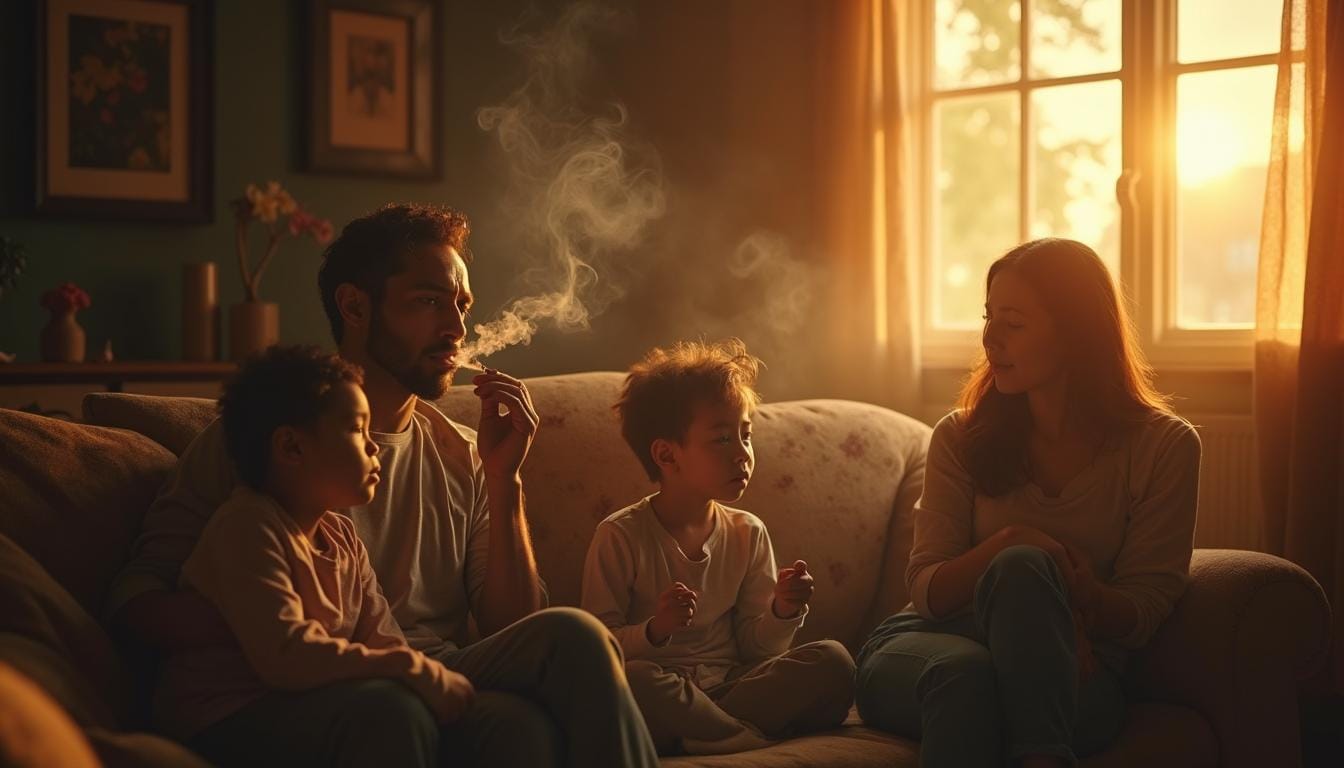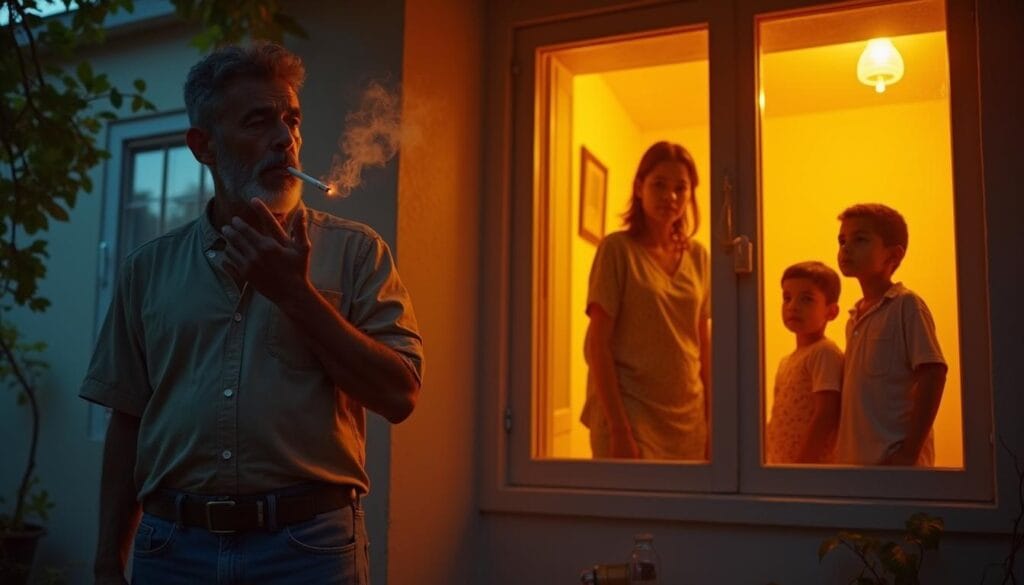How Smoking Harms Your Relationships and Family: The Invisible Cost of Addiction


Written By: Aman Doda
Last Updated: 10/01/2025


- The hidden ways smoking damages your relationships and family life.
- How secondhand smoke harms your loved ones, especially children.
- The emotional distance smoking creates between you and those you care about.
- The financial and role model impact smoking has on your family.
- Steps to rebuild your relationships after quitting smoking.
- A real-life testimonial of a QSFS participant who quit smoking and improved their family relationships.
- 01: Introduction: The Invisible Toll of Smoking on Your Loved Ones
- 02: Secondhand Smoke: Putting Your Family’s Health at Risk
- 03: Emotional Distance: How Smoking Creates Barriers Between You and Loved Ones
- 04: Financial Strain: The Hidden Cost of Smoking on Your Family’s Future
- 05: The Role Model Effect: What Are You Teaching Your Children?
- 06: How Smoking Harms Intimate Relationships
- 07: Rebuilding Trust and Connection After Quitting Smoking
- 08: Watch This: Understanding the Root Cause of Smoking
- 09: Real-Life Testimonial:Mehul Quit Smoking Experinece
- 10: FAQs: Smoking and Wellness
- 11: Conclusion: Your Journey Toward a Balanced, Smoke-Free Life
- 12: Disclaimer
The Invisible Toll of Smoking on Your Loved Ones
Smoking is often thought of as a personal choice, but the reality is far more complicated. When you smoke, the effects ripple far beyond your own health. They touch the lives of everyone around you—your spouse, children, parents, friends, and even coworkers.
Imagine this: every time you light a cigarette, you’re not just inhaling toxins into your body; you’re also exhaling secondhand smoke into the air your loved ones breathe. But the damage doesn’t stop at physical health. Smoking creates emotional distance, financial stress, and even erodes the trust and respect within your relationships.
💬 Think About This: Smoking isn’t just stealing your health—it’s quietly stealing the joy and connection from your relationships. But the good news is, by quitting, you have the power to rebuild and strengthen those bonds.
Ready to reclaim your relationships and reconnect with your loved ones? Join our FREE Masterclass to learn how to quit smoking for good.
Secondhand Smoke: Putting Your Family’s Health at Risk
When you smoke, it’s not just your lungs and heart at risk. Your family, especially children, are exposed to the dangers of secondhand smoke, whether you smoke indoors, outdoors, or even in your car.
How Secondhand Smoke Affects Your Loved Ones:
- Increased Health Risks for Children:
- Asthma, bronchitis, and pneumonia are more common in children exposed to secondhand smoke.
- Children are more vulnerable to ear infections, which can affect their hearing and development.
- Pregnancy Complications:
- If your partner smokes during pregnancy, it increases the risk of premature birth, low birth weight, and developmental issues for the baby.
- Long-Term Health Damage for Adults:
- Spouses or parents who breathe secondhand smoke are at a higher risk of heart disease, lung cancer, and stroke, even if they don’t smoke themselves.
💡 Fact: The American Lung Association reports that secondhand smoke contains over 7,000 chemicals, of which 70 are known to cause cancer.
Want to understand the full extent of secondhand smoke’s impact? Read our blog The True Cost of Smoking on Your Family’s Health.


💡 Think of your immune system as a security team. Smoking sends that team on a lunch break, leaving your body unprotected from intruders.
Emotional Distance: How Smoking Creates Barriers Between You and Loved Ones
Smoking doesn’t just create a physical barrier—it creates an emotional one too. Many smokers feel guilty about their habit but don’t know how to quit, and this guilt can create tension in relationships.
How Smoking Causes Emotional Distance:
- Arguments About Smoking: Loved ones often express concern or frustration about smoking, leading to frequent conflicts.
- Feeling of Isolation: Smokers may feel judged or misunderstood, causing them to withdraw emotionally from their family or friends.
- Loss of Quality Time: Frequent smoke breaks interrupt family activities, meals, and conversations, reducing time spent together.
💬Smoking is like building a wall of smoke between you and your loved ones. Every cigarette adds another brick to that wall, making it harder to connect.
Discover how quitting smoking can restore emotional intimacy in our blog How Smoking Affects Emotional Health and Relationships.


The Financial Strain Smoking Places on Families
Smoking doesn’t just cost you your health—it also takes a significant toll on your finances. In India, the cost of smoking is no small matter. On average, a smoker spends around Rs. 250 per day on cigarettes or other forms of nicotine. While it may not seem like much on a single day, the numbers add up quickly:
- Monthly Expense: Rs. 7,500 (for a pack-a-day smoker).
- Yearly Expense: Rs. 90,000.
💬 Think About This: That’s Rs. 90,000 that could have gone toward your child’s education, a family trip, home improvements, or even an investment in your family’s future.
And that’s just the direct cost. There are hidden expenses too:
- Healthcare Bills: Nicotine-related illnesses like lung infections or heart disease lead to increased hospital visits and expensive treatments.
- Lost Productivity: Smokers take frequent breaks, which could hurt your earning potential or lead to missed opportunities at work.
💬 Imagine This: Over 10 years, you’re burning through Rs. 9,00,000—nearly a down payment for a new house or a college fund for your child.
Learn more about the financial cost of smoking in our detailed blog: The Hidden Financial Impact of Smoking.


The Role Model Effect: What Are You Teaching Your Children?
Children are like sponges—they absorb everything they see, hear, and experience. When you smoke, you’re not just affecting your health; you’re sending a message to your children about what’s acceptable or normal behavior. Whether you realize it or not, your actions shape their attitudes toward smoking and health in general.
How Smoking Influences Children:
- Increased Likelihood of Smoking:
- Studies show that children of smokers are twice as likely to start smoking themselves. Watching a parent smoke normalizes the habit, making it seem less dangerous.
- Perception of Addiction:
- Seeing a parent or caregiver struggle to quit sends a message that smoking is something you can’t control, which can make children feel powerless if they try it themselves.
- Emotional Impact:
- Children often worry about their parents’ health. They may feel anxious or helpless, especially if they see you coughing, wheezing, or visiting doctors frequently.
💬 Think About This: Every cigarette you smoke in front of your children is teaching them that smoking is acceptable—and it might even encourage them to follow in your footsteps.


How Quitting Makes You a Better Role Model:
- Quitting smoking shows your children the value of determination and the importance of prioritizing health.
- It teaches them that it’s okay to face challenges, ask for help, and overcome obstacles for the betterment of yourself and your family.
Explore the deeper impact of being a role model in our blog Why Your Quit Smoking Journey Inspires Generations.
How Smoking Harms Intimate Relationships
Smoking doesn’t just create distance with family—it deeply impacts romantic and intimate relationships. Whether you’re dating, married, or in a long-term partnership, smoking adds tension, reduces emotional intimacy, and even affects physical attraction.
How Smoking Affects Your Partner:
- Health Concerns:
- Your partner may constantly worry about the long-term health risks you face due to smoking, causing emotional strain in the relationship.
- Physical Barriers:
- Bad breath, lingering smoke odor, and yellowed teeth can affect physical intimacy and attraction.
- Emotional Frustration:
- If your partner doesn’t smoke, they might feel isolated, frustrated, or even resentful, especially if they’ve expressed concern and feel unheard.
- Shared Goals at Risk:
- Smoking drains finances and time that could otherwise be used for shared dreams like travel, homeownership, or starting a family.
💬 Fact: Studies show that non-smoking partners of smokers are more likely to feel emotionally neglected due to the time and money spent on cigarettes.
Rekindle your relationships and strengthen your bonds. Join our FREE Masterclass to take the first step toward quitting smoking.


Rebuilding Trust and Connection After Quitting Smoking
Quitting smoking isn’t just about improving your health—it’s about rebuilding the trust, connection, and happiness that smoking has taken away from your relationships. The good news? Your loved ones will notice the changes almost immediately.
How to Reconnect After Quitting:
- Acknowledge the Past:
- Be honest with your loved ones about your struggle with smoking and how it affected them. This shows accountability and opens the door for healing.
- Celebrate the Milestones Together:
- Involve your family or partner in your quit-smoking journey. Celebrate each milestone, no matter how small, together.
- Create Smoke-Free Memories:
- Replace smoking habits with activities that bring you closer to your family and partner. For example, take evening walks, cook together, or enjoy hobbies as a family.
- Use Your Story to Inspire:
- Share your journey with your loved ones to show them the positive changes you’re experiencing. This strengthens your role as a positive influence.
💬 Imagine sitting at the dinner table without feeling the need to step away for a cigarette. You’re fully present, sharing laughs and creating memories that last a lifetime.


🎙️ Audio Testimonial: Hardik’s Experience with QSFS
Hardik shared his experience with us in a heartfelt audio testimonial. “I used to think I could quit on my own, but every attempt left me frustrated. QSFS gave me the tools to overcome not just the cravings, but the emotional triggers too. I’m proud to say I’ve been smoke-free for 8 months, and I’ve never felt better.”
Watch This: Understanding the Root Cause of Smoking
“Most smokers think their inability to quit stems from a lack of willpower, but the truth is deeper. Smoking isn’t just a habit—it’s an addiction tied to emotional and psychological triggers. In this video, I’ll explain why so many people struggle to quit and how addressing the root cause is the first step to breaking free.”
Mehul’s Journey to a Smoke-Free Life (1+ Year Quit!)
Watch This: Mehul’s Journey to a Smoke-Free Life (1+ Year Quit!)
Mehul’s story is truly inspiring. After more than a decade of smoking, he felt trapped and unsure if he could ever quit. With the help of QSFS, he achieved something incredible—he’s now over a year smoke-free. His words remind us that quitting smoking isn’t just about health; it’s about reclaiming your life, your relationships, and your dreams.
FAQs: Smoking and Its Impact on Relationships
Smoking exposes your family to secondhand smoke, increasing their risk of respiratory illnesses, asthma, and even cancer.
Absolutely. Quitting removes physical and emotional barriers, reduces stress, and allows you to reconnect with loved ones.
It’s never too late. The sooner you quit, the sooner you’ll experience improvements in your health and relationships.
Share your goals with them, celebrate milestones together, and ask for their support to stay smoke-free.
Be open, honest, and consistent in your efforts to quit. Let your actions show your commitment to change.
Watch This : Understanding the root casue of smoking
Most smokers believe that their inability to quit stems from a lack of willpower. But the truth is, smoking isn’t just a habit—it’s an addiction deeply tied to emotional, psychological, and behavioral triggers. In my latest video, I break down the real reason why so many people struggle to quit and how understanding the root cause is the first step to breaking free.
Choose Connection Over Cigarettes
Smoking takes more than just years off your life—it takes time, energy, and joy away from the people who matter most. But the power to change is in your hands. By quitting, you’re not just reclaiming your health—you’re reclaiming your role as a parent, partner, and loved one.
The journey to quitting isn’t always easy, but it’s worth it—for you and for them. Imagine a life where you’re fully present, creating memories, and building a future free from the shadow of smoking.
Take the first step toward a healthier, happier family. Join our FREE Masterclass today and start your journey to freedom.
Disclaimer
The information provided in this blog is for educational and informational purposes only and is based on general wellness principles. It is not intended to replace professional medical advice, diagnosis, or treatment. Always consult a qualified healthcare provider or trusted expert before making decisions about your health, quitting smoking, or starting any wellness program. Individual results may vary depending on personal circumstances, level of commitment, and other factors. Testimonials shared are genuine experiences but do not guarantee specific outcomes. Quitting nicotine and improving your overall wellness is a deeply personal journey that may require expert guidance, structured support, and a personalized approach
Share via:
